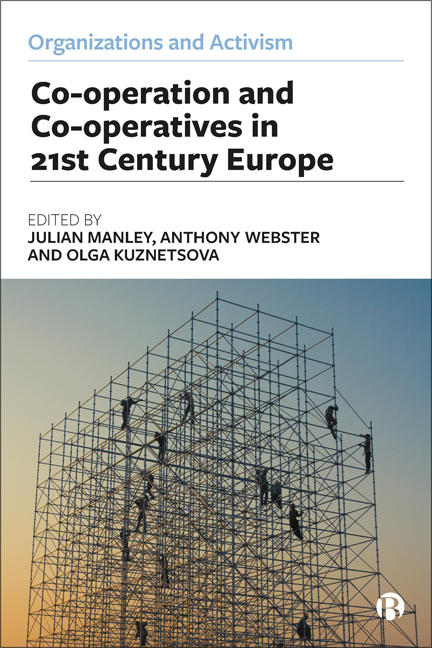Book contents
- Frontmatter
- Dedication
- Contents
- Series Editors’ Preface
- List of Figures and Tables
- List of Abbreviations
- Notes on the Contributors
- Acknowledgements
- Foreword
- 1 Introduction: European Co-operativism in a Changing World
- PART I Seeds: Identifying the Space for Co-operatives in Addressing Social Challenges
- PART II Bridges: Co-operative Culture and Education
- PART III Growth: The Preston Model, Co-operation and Community Wealth Building
- Index
5 - The Promise and Perils of Corporate Governance-by-Design in Blockchain-Based Collectives: The Case of dOrg
Published online by Cambridge University Press: 28 March 2024
- Frontmatter
- Dedication
- Contents
- Series Editors’ Preface
- List of Figures and Tables
- List of Abbreviations
- Notes on the Contributors
- Acknowledgements
- Foreword
- 1 Introduction: European Co-operativism in a Changing World
- PART I Seeds: Identifying the Space for Co-operatives in Addressing Social Challenges
- PART II Bridges: Co-operative Culture and Education
- PART III Growth: The Preston Model, Co-operation and Community Wealth Building
- Index
Summary
Introduction
This chapter analyses the emergence of new collectivist organizations in response to the growth of the platform economy, with a particular focus on a blockchain-based software developers’ collective, dOrg. This digital collective seeks to respond to a 21st-century challenge: providing decent conditions and agency to workers in a world experiencing globalization, digitalization and rising inequality. As with other contributions to this volume, this chapter shows what alternative business structures, such as cooperatives and collectives, can offer to discussions on the future of work, while also highlighting how organizations like dOrg innovate long-standing cooperative governance structures. Through a case study of this transnational collective, I describe how its governance structure innovates upon, and departs from, Rothschild and Whitt's (1989, pp 62–63) two ideal types of organization – the bureaucratic organization and the collectivist-democratic organization. I then go on to demonstrate how dOrg addresses agency problems by way of what I call corporate governance-by-design (Mannan, 2018, p 191). In the last part of the chapter, I explain how this concept varies from traditional corporate governance and evaluate the extent to which the measures introduced to achieve corporate governance-by-design, such as reputation-weighted voting, address the governance challenges faced by such organizations. I conclude by reflecting on the lessons that organizations like dOrg can offer co-operatives in the 21st century.
It is necessary to clarify the usage of certain terms. In this chapter, a platform refers to a business model used by firms to bring together various groups and intermediate transactions of tangible and intangible resources between them (Montalban et al, 2019, p 807). There is a wide variety of businesses that use the platform business model (that is, platform firms) in existence, but this chapter focuses particularly on labour platforms. These are platforms where users on one side of a platform provide labour for users on other side(s) of the platform. Through the suite of technologies used by labour platform firms – from their proprietary matching algorithms to their users’ smartphone sensors – the platform collects, processes and uses data to encourage and facilitate these interactions (Mannan, 2022). These firms are asset-light in the sense that they do not own physical assets or produce goods or provide services themselves but rely on the labourers to use their own assets to supply goods and services to other users by transacting on the platform's marketplace.
- Type
- Chapter
- Information
- Publisher: Bristol University PressPrint publication year: 2023



